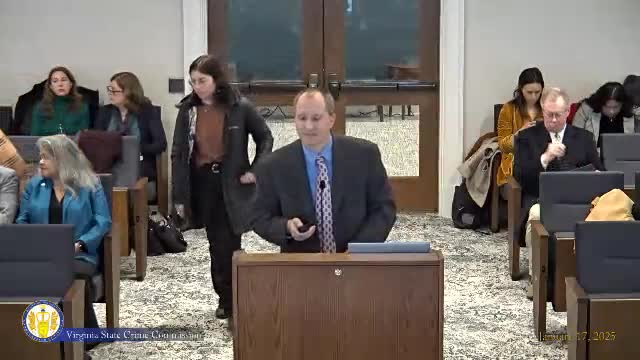Crime commission backs changes to criminal record sealing, adopts seven amendments
Get AI-powered insights, summaries, and transcripts
Subscribe
Summary
The Virginia Crime Commission voted to recommend legislation updating the state's criminal-record sealing process, adopting amendments on restitution, sentencing guidelines, bail, firearms, response time, automatic sealing and penalties.
The Virginia Crime Commission voted to recommend legislation to revise the state's criminal-record sealing process, adopting a package of amendments intended to clarify implementation and limit who may benefit from sealing.
The measure, described to commissioners by staff attorney Colin Stahl as a rewrite of the 'sealing' process in advance of laws taking effect July 2025, would expand automatic sealing for many nonconviction marijuana possession and related charges, create a petition process for records eligible for automatic sealing but not sealed because of clerical or transmission errors, and add explicit rules for ancillary matters such as suspended sentences, probation, parole violations, contempt, failures to appear and bond appeals.
Commissioners said the draft resolved some implementation gaps from the 2021 law but required additional limits. The panel adopted seven amendments during a lengthy debate: requiring payment of restitution before a petition-based sealing, allowing sealed convictions to be used in calculating sentencing guidelines, allowing sealed convictions to be considered at bail determinations, narrowing 'sealing in the moment' to dismissals with prejudice and acquittals, extending the Commonwealth's response time on petitions from 21 to 30 days, excluding certain firearm-related offenses unless the petitioner's firearms rights have been restored, and aligning penalties for improper disclosure with the expungement statute.
Commission members emphasized the distinction between automatic sealing and petition-based sealing. Under the draft, some misdemeanor nonconvictions would be 'sealed in the moment' by court order unless an exception applied; felony automatic-sealing would remain narrower and generally require Commonwealth consent for acquittals or dismissals with prejudice. Staff told the commission the draft also limits access to sealed records to the central criminal records repository (CCRE), law enforcement, courts and the DMV and addresses technical issues flagged by state police and courts.
Debate focused on several practical and public-safety concerns. Delegate Delaney Gilbert, who offered or sponsored many of the adopted amendments, pressed for restitution to victims to be paid before a petitioner could use the petition process. Gilbert said the change would prevent petitioners from 'being in a posture' to seek sealing while owing restitution. The commission approved that amendment by voice vote.
Gilbert also successfully moved to make sealed offenses available for use in calculating sentencing guidelines and for bail determinations, arguing that those uses apply when a person reoffends and should not be shielded by sealing. Commissioners discussed the technical limits of sentencing-guidelines methodology; staff said current law prohibits use of sealed offenses in some contexts but the amendment would explicitly allow guideline writers and those preparing presentence information to see sealed records for new felony sentencing events.
Members also debated 'sealing in the moment' for nolle prosequi dispositions and agreed to treat such misdemeanor dispositions the same as felony dispositions: they will not automatically seal in the moment but remain eligible through the petition process. The commission extended the period for the Commonwealth to respond to sealing petitions from 21 days to 30 days to allow victim notification and consultation with victim-services obligations under the victim's bill of rights.
Firearm offenses prompted extended discussion. Commissioners agreed to exclude from petition eligibility any nonviolent felony in which a firearm was used, unless the petitioner has had firearms rights restored. Staff noted that some firearms-related offenses (reckless handling, brandishing, discharge in public) would remain eligible under the draft because they are class 5 or 6 felonies; the amendment focused on nonviolent felonies in which a firearm was used in the underlying offense.
Public comment drew support from court clerks and court staff. Randy Curran, clerk of the circuit court of Suffolk and a representative of the Virginia Court Clerk's Association, told the commission, "Our association supports the legislation to include the amendments today. We think it's good and also to include the budgetary portion that is part of it." The Office of the Executive Secretary and other court administrators flagged technical and fiscal impacts to case-management systems.
Not all officials supported the measure. An Office of the Attorney General representative, who said she had been philosophically opposed to the legislation, told commissioners she would vote against recommending the draft and called parts of the bill 'one of the most misbegotten, convoluted pieces of legislation' she had seen. Another law-enforcement appointee likewise criticized the bill as a 'concealment bill' and said it could hide serious information from the public and courts.
After debate and the series of amendments, the commission took a roll-call vote and approved recommending the revised sealing bill to the General Assembly. The roll call recorded nine votes in favor and four opposed.
The commission directed staff to continue technical work on implementation issues, including system changes at the state police and courts, and to reflect the adopted amendments in the final draft for legislative referral.
Votes at a glance: The commission voted to recommend the sealing-of-criminal-records legislation as amended; the measure passed on a roll call 9-4.
